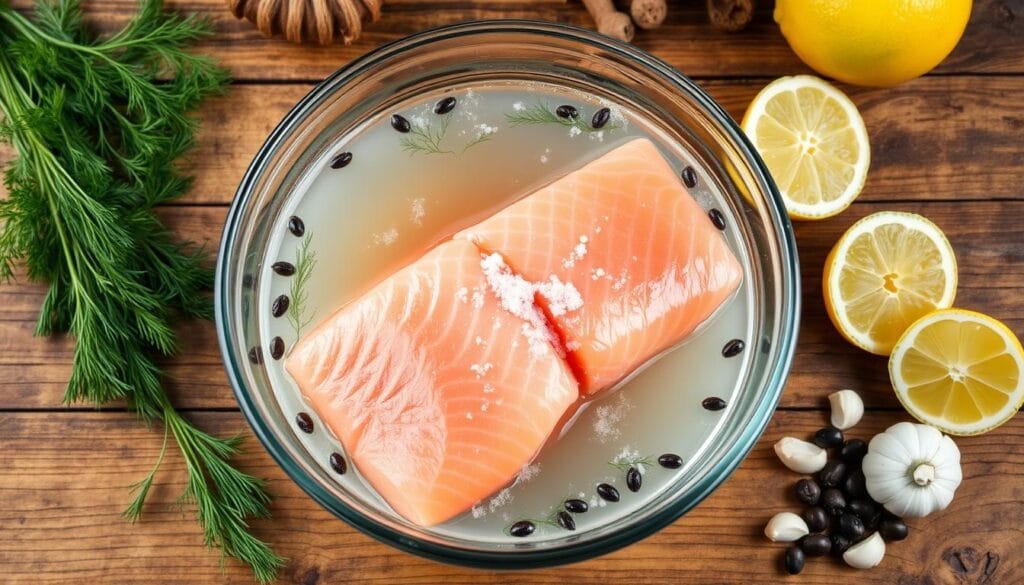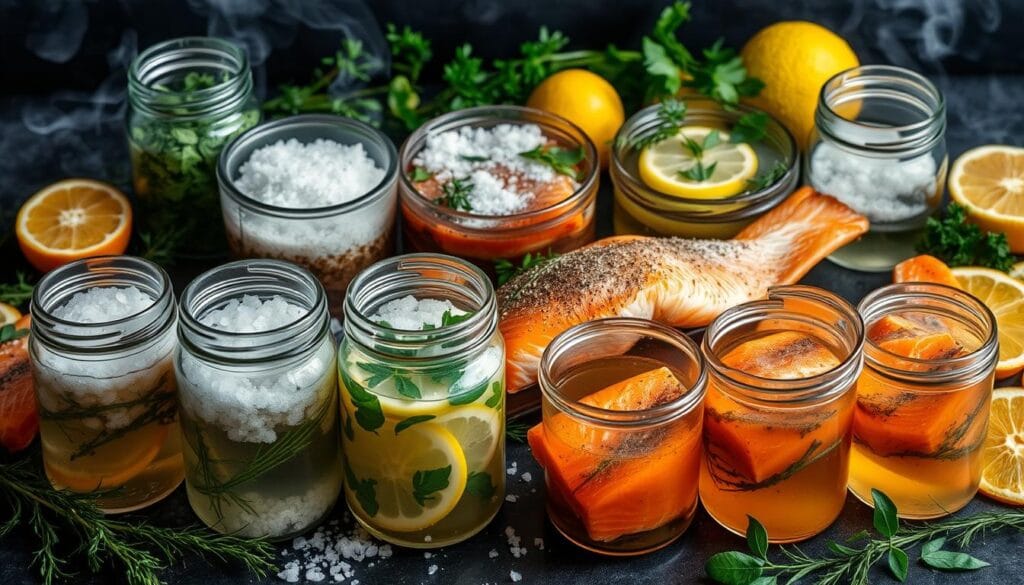Do you have to brine salmon before smoking?: The first time I smoked salmon, I didn’t know how important brining was. My first try was a disaster, with dry and flavorless fish. But I learned a valuable lesson: always brine salmon before smoking.
Brining salmon is more than a suggestion; it’s a must for great-tasting fish. It’s your secret to success when smoking salmon. It adds flavor and keeps the fish moist during smoking.
Both professional chefs and home cooks know brining is crucial. It does more than add taste; it makes the fish tender and prevents it from drying out. This is why smoking salmon is so loved.
Key Takeaways:do you have to brine salmon before smoking?
- Brining is essential for creating moist and flavorful smoked salmon
- The process helps prevent dryness and white albumin formation
- Brining enhances both texture and taste of the salmon
- Different brining methods can be used depending on preference
- Proper brining takes your smoking salmon technique to the next level
Understanding the Importance of Brining Salmon
Salmon preparation is key to turning a simple fish into a culinary delight. Brining is a crucial technique that boosts salmon’s flavor and texture. It’s loved by both home cooks and professional chefs.

Brining is a vital step in preparing salmon for smoking. It’s not just seasoning; it’s a science to improve salmon quality.
Why Brining is Essential for Smoked Fish
Brining does several important things for salmon:
- It removes extra moisture from the fish.
- It makes the natural flavors stronger.
- It creates a protective layer for smoking.
- It helps keep the fish fresh.
Effects of Salt on Salmon Texture
Salt is a game-changer in seafood curing. It breaks down protein structures, making the salmon firmer and more tender. Salt goes deep into the salmon, giving it an unforgettable balanced flavor.
Benefits of Pre-Smoking Treatment
Professional chefs know brining is essential. By soaking in a brine for 12 to 24 hours, salmon gets:
- Better moisture retention.
- Deeper flavor.
- Improved smoking results.
- Enhanced preservation.
“Brining is the secret weapon that transforms good salmon into extraordinary smoked delicacy.” – Culinary Experts
Your brining method can greatly impact your smoked salmon. With the right technique, you’ll bring out the best in this amazing fish.
Types of Brining Methods for Smoking Salmon
Choosing the right brining method is key when smoking salmon. It affects the flavor and texture. Knowing the best brining tips will help you make delicious smoked salmon.

Smoking salmon needs careful prep, and brining is crucial. It boosts flavor and texture. Let’s look at the techniques that can improve your cooking skills.
Wet Brining Technique
Wet brining soaks salmon in a salty, sugary liquid. It infuses deep flavors and keeps moisture in. Here are some tips for wet brining:
- Optimal brining time: 3-8 hours
- Typical brine ratio: 1:1 sugar to salt
- Liquid components: water, soy sauce, white wine
Dry Brining Process
Dry brining is a different way to prepare salmon. It uses a salt and sugar mix on the salmon’s surface. This method offers:
- Less messy preparation
- Faster processing time
- More controlled seasoning
Combination Methods
Professional chefs often mix wet and dry brining. This hybrid method gets the best of both worlds. It enhances flavor while keeping the salmon tender.
“The art of smoking salmon lies in understanding the nuanced brining techniques that transform an ordinary fish into a culinary masterpiece.”
Whichever method you choose, watch the brining time and salt level. Brining for over 8 hours can make the salmon too salty and tough.
Do You Have to Brine Salmon Before Smoking
Brining is key when making smoked salmon. Both pros and home cooks say it’s essential. It ensures the best taste and texture.
- Enhances moisture retention
- Improves overall flavor profile
- Helps create a protective layer for smoking
- Prevents the salmon from becoming too dry
Brining is simple but vital. Here’s what to keep in mind when brining salmon:
| Brining Method | Time Required | Salt-to-Sugar Ratio |
|---|---|---|
| Dry Brining | 30-45 minutes | 2 cups salt, 2 cups sugar |
| Wet Brining | 6-8 hours | 1:1 salt and sugar solution |
“Brining transforms an ordinary piece of salmon into a flavor-packed delicacy.” – Culinary Expert
While you can smoke salmon without brining, it’s risky. It might turn out dry and tasteless. Salt breaks down proteins, making the salmon more flavorful and moist.
Pro tip: Always brine for smoked salmon recipes. Your taste buds will appreciate it!
Essential Ingredients for Perfect Salmon Brine
Making the perfect salmon brine is key to great smoked salmon. The right mix of ingredients can turn simple fish into a dish to remember. Knowing how to brine salmon can improve your smoking skills.
Salt and Sugar Ratios
The base of a good brine is the salt and sugar mix. Experts say a specific ratio is best for flavor and texture. For your smoked salmon, try this classic mix:
- 1/4 cup kosher salt
- 1/3 cup sugar
- 4 cups liquid (water, soy sauce, wine blend)
Optional Flavor Enhancers
Boost your brine with extra ingredients. Some favorites include:
- Herbs: Dill, thyme, rosemary
- Spices: Black pepper, garlic powder, paprika
- Liquid enhancers: White wine, apple cider, bourbon
Liquid Components
The liquid in your brine is important for keeping it moist and flavorful. Cold water is often used. But adding soy sauce and white wine can add depth.
“The secret to perfect smoked salmon is in the brine” – Culinary Experts
Brining time is important. Aim for 3 hours but don’t go over 8 hours. This prevents the salmon from becoming too salty or mushy. Your goal is to have salmon that’s perfectly seasoned and moist for smoking.
Step-by-Step Dry Brining Process
Dry brining is a key method in preparing salmon. It boosts the flavor and texture. Unlike wet brining, dry brining uses a salt and sugar mix directly on the salmon’s surface. This creates a strong flavor.
Here’s a detailed guide to mastering dry brining:
- Prepare the dry brine mixture:
- Use a 4:1 ratio of brown sugar to kosher salt
- For 3 fish (6 filets), mix 2 cups brown sugar and ½ cup kosher salt
- Prepare the salmon:
- Cut filets into pieces around 0.75 lbs each
- Pat salmon dry with paper towels
- Ensure surface is completely clean
- Apply the dry brine:
- Evenly coat salmon with the salt-sugar mixture
- Cover with plastic wrap
- Refrigerate for 12-24 hours
After brining, rinse the salmon well and pat it dry. Pro tip: Let the salmon develop a pellicle by air drying for 1-3 hours in a cool, ventilated area.
The key to successful dry brining is maintaining the right salt-to-sugar ratio and ensuring even coverage.
Your dry brining technique will turn ordinary salmon into a delicious smoked treat. It will concentrate flavors and improve the texture. This will make your cooking experience even better.
Wet Brining Time and Temperature Guidelines
Learning about time and temperature is key to mastering salmon brining. Your smoked salmon will turn out better when you follow the right wet brining guidelines.
The brining process needs a balance of salt, time, and temperature. You must adjust your method based on the salmon’s thickness.
Optimal Brining Duration
Timing is crucial when wet brining salmon. Here are the brining times for different fillet thicknesses:
- Thin fillets: 8 hours
- Average thickness: 10 hours
- Thick fillets: 12 hours
“The key to perfect smoked salmon is patience during the brining process.” – Professional Seafood Chef
Temperature Control Tips
Keeping the right temperature is vital for safe and tasty smoked salmon. Always keep your brine and fish in the fridge at 34°F to 40°F to stop bacteria from growing.
| Brining Stage | Temperature | Duration |
|---|---|---|
| Refrigeration | 34-40°F | 8-12 hours |
| Pellicle Development | 60°F or cooler | 2-4 hours |
| Initial Smoking | 140-150°F | Up to 1 hour |
Remember, different salmon types and sizes might need slight changes to these guidelines. Always watch your fish closely and use a meat thermometer for the best results.
Common Brining Mistakes to Avoid
Mastering salmon preparation means avoiding key brining mistakes. These errors can ruin your dish. Knowing what to avoid helps you make perfect smoked salmon every time.
Key Brining Errors to Watch Out For
- Over-salting your salmon brine
- Using incorrect salt types
- Improper brining duration
- Neglecting temperature control
One important tip is to get the salt-to-water ratio right. Use 1 cup of kosher salt for every 10 cups of water. Avoid iodized table salt and choose kosher salt brands like Morton’s or Diamond Crystal.
“Precision is key in salmon preparation – every detail matters.”
Brining time is critical. Most salmon cuts need 8-12 hours, but smaller fish might only need 4-6 hours. Watch for signs of over-brining to avoid too salty fish.
| Brining Mistake | Consequences | Solution |
|---|---|---|
| Over-salting | Extremely salty fish | Reduce salt quantity, rinse before smoking |
| Under-brining | Bland flavor | Extend brining time, ensure proper salt ratio |
| Wrong salt type | Uneven curing | Use kosher salt exclusively |
Always rinse your salmon after brining and let it dry well before smoking. This step is crucial for the best texture and flavor in your smoked salmon.
Preparing Salmon After Brining
After brining, your salmon is ready for a crucial step that affects its quality. You need to create a protective layer called a pellicle and dry it properly.
Creating the Perfect Pellicle
A pellicle is a tacky layer on the salmon’s surface. It helps the smoke stick during smoking. To make this layer, follow these steps:
- Remove salmon from brine and pat dry with paper towels
- Place salmon on a clean rack in the refrigerator
- Leave uncovered for 4 hours to develop the pellicle
- Ensure good air circulation around the fish
Drying Techniques for Optimal Results
Drying is key in salmon preparation. You can use several methods:
| Technique | Duration | Benefits |
|---|---|---|
| Refrigerator Air-Drying | 4-6 hours | Consistent temperature, minimal moisture |
| Room Temperature Drying | 30-60 minutes | Faster pellicle formation |
| Fan-Assisted Drying | 1-2 hours | Accelerated moisture removal |
“The key to exceptional smoked salmon lies in the details of post-brining preparation.” – Culinary Experts
You’ll get a delicious, professionally prepared salmon by following these steps. It’s ready for the smoking process.
How Different Salmon Cuts Affect Brining Time
When you’re preparing salmon, it’s important to know about the different cuts. Each cut has its own challenges and benefits for brining.
The thickness of your salmon is key. Thin cuts like pink salmon or trout fillets need less brining time. But thick king salmon pieces need more time.
“Precision in brining is the key to exceptional smoked salmon.” – Professional Salmon Smoker
Adjust your brining plan based on the salmon cut you’re using:
- Thin fillets (trout or pink salmon): Minimum 4 hours brining
- Medium cuts (sockeye, silver salmon): Approximately 8 hours brining
- Thick king salmon pieces: Up to 36 hours brining
When preparing salmon, keep the salt right and avoid over-brining. Too much salt can make the fish too salty.
| Salmon Cut | Thickness | Recommended Brining Time |
|---|---|---|
| Pink Salmon/Trout | 1/2 inch | 4-6 hours |
| Sockeye/Silver Salmon | 3/4 inch | 8-12 hours |
| King Salmon | 1-2 inches | 18-36 hours |
Remember, curing fish needs attention to detail. Don’t brine for more than 48 hours to avoid too much salt. The aim is to add flavor without losing the fish’s softness.
Flavor Variations and Seasoning Options
Exploring smoked salmon recipes opens up a world of exciting flavors. Whether you’re a pro chef or a home cook, learning about salmon brining tips can make your smoking better.
Traditional seasonings are key to tasty smoked salmon. Classic mixes usually include:
Traditional Flavor Foundations
- Kosher salt (Morton’s or Diamond Crystal)
- Brown sugar
- Black peppercorns
- Bay leaves
- Juniper berries
Modern Flavor Innovations
Today’s smoked salmon recipes try new things. You can try out new flavors to make your dish better:
- Soy sauce marinade
- White wine infusions
- Maple syrup glazes
- Fresh herb blends
- Citrus zest combinations
When making your salmon brining tips, aim for balance. A good dry brine mix is 3 parts sugar to 1 part kosher salt. For wet brines, use 20 parts water to 1 part salt for the right seasoning.
“The secret to exceptional smoked salmon lies in understanding how flavors interact and complement each other.” – Professional Seafood Chef
Don’t forget, that different wood chips like apple, cherry, and maple change your salmon’s taste. Be bold and find your own special smoked salmon recipe.
Storage and Safety Tips for Brined Salmon
Seafood curing needs careful attention to storage and safety. When you make brined salmon, handling it right is key. This ensures both quality and safety. Your smoked salmon stays delicious and safe with the right preservation tips.
After you finish curing the fish, refrigeration is key. Smoked salmon should go in the fridge. It’s best to eat it within certain times to keep the taste good and stop bacteria growth.
“Proper storage is the secret to preserving the exquisite flavor of your smoked salmon” – Professional Seafood Chef
Refrigeration Guidelines
- Refrigerate brined salmon right after smoking
- Store in airtight containers or vacuum-sealed bags
- Keep refrigeration temperature at or below 40°F
Your smoked salmon stays fresh for up to two weeks in the fridge. Freezing is a great option for longer storage.
| Storage Method | Duration | Quality Preservation |
|---|---|---|
| Refrigeration | Up to 2 weeks | High |
| Freezing | Up to 3 months | Very High |
Pro tip: Always label your stored salmon with the date of smoking to track freshness and ensure food safety.
Safety Indicators
- Check for off-odors
- Inspect for discoloration
- Feel for unusual texture changes
- Discard if any signs of spoilage appear
By following these seafood curing storage tips, you’ll enjoy safe, delicious smoked salmon every time.
Conclusion
Knowing if you need to brine salmon before smoking is key to great results. Brining turns regular fish into a tasty treat, making it last longer. It goes from lasting 5-7 days to 2-3 weeks.
Brining also makes the fish taste better and feel softer. Your smoked salmon will get even better with brining. It’s all about the right salt mix, brining time, and smoking heat.
Smoking salmon at home can be as good as in a restaurant. Different fish types like King and Sockeye react differently to brining. Leaner fish gets the most benefit.
Smoking well means paying close attention to every detail. The salt-to-water mix and keeping the heat steady are crucial. Try out different brining ways and flavors. Keep working on your skills.
Soon, you’ll make smoked salmon that will wow everyone. It’s all about practice and patience. You’ll get better and better at making it.
FAQs
Is brining necessary before smoking salmon?
Brining is not required but highly suggested for smoking salmon. It boosts flavor, texture, and prevents drying. Brining adds moisture and preserves the fish, making it taste better.
What’s the difference between wet and dry brining?
Wet brining soaks salmon in a salt solution. Dry brining uses salt and spices on the fish’s surface. Wet brining is easier, while dry brining intensifies flavors.
How long should I brine salmon before smoking?
Brining time depends on salmon thickness and flavor desired. Wet brining takes 4-8 hours for most fillets. Dry brining is 2-4 hours. Thicker pieces may need longer, thinner ones less.
Can I skip brining altogether?
Smoking salmon without brining is possible but not advised. It can make the fish dry and tasteless. Brining protects the fish and adds flavor and moisture.
What are the key ingredients for a basic salmon brine?
A basic brine includes kosher salt, brown sugar, and water for wet brining. Dry brining uses kosher salt and brown sugar. You can add black pepper, garlic powder, and herbs for extra flavor.
How do I know if I’ve over-brined my salmon?
Over-brining shows as a very salty taste, tough texture, and a leather-like surface. If the salmon feels too firm or salty, it’s over-brined. Stick to recommended times and use the right salt ratio.
What’s a pellicle, and why is it important?
A pellicle is a tacky layer on the salmon’s surface after brining and drying. It helps smoke stick to the fish and protects it during smoking. To get a good pellicle, pat the salmon dry and let it sit for 1-2 hours until it’s shiny and slightly sticky.
Can I use different types of salt for brining?
Use kosher salt for brining because of its clean taste and easy dissolving. Avoid iodized table salt for its metallic taste. Sea salt is okay, but avoid fine-grain salts. Always measure salt carefully to keep the right brining concentration.

